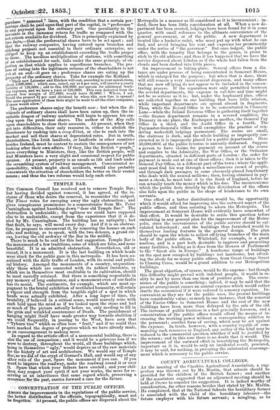CONCENTRATION OF THE PUBLIC OFFICES. AMONG the improvements in the
regulations of the public service, the better distribution of the officials, topographically, must not be forgotten. At present,-thapublic offices are dispersed about the An improvement is taking place. Several offices from a dis- tance are under process of being concentrated in Somerset House, which is enlarged for the purpose ; but when that is done, there will still remain a very inconvenient dispersion, and many offices that are now off-lying do not appear to be included in the concen- trating process. If the separation were only permitted between the several departments, the expense in cab-hire and time might not be so serious as it is ; but, under the haphazard plan, offices are collected together in one building that have little relation, while important departments are spread abroad in fragments. Thus, while the Record Office is to be concentrated in Chancery Lane—while the Inland Revenue Office is gathering itself together —the finance department remains in a severed condition, the Treasury in one place, the Exchequer in another, the General Pay Office in a third, and the Audit Office in a fourth. The Paymaster-General's Office well exemplifies the practice of ren- dering makeshift lodgings permanent. The rooms are small, the staircase is dark, and the whole building as improperly con- structed as it is improperly placed for a public department. Here 50,000,000/. of the public revenue is annually disbursed. Suppose a person to have claims for payment on account of the stores and supplies to the Admiralty, the War Office, or the Ordnance departments, situated in different parts of London : the order for payment is made out at one of those offices ; then it is taken to the General Pay Office, in a different part of the town; where the appli- cant must find his way through a miscellaneous crowd of people, and through dark passages, to some obscurely-placed functionary who deals with the annual millions ; then, having obtained in pay- ment a check, he must take it to the Bank of England, before he can actually touch the money which is his due. The inconvenience which the public feels directly by this distribution of the offices also falls upon the public in the shape of hinderance to its own servants.
One effect of a better distribution would be, the opportunity which it would afibrd for improving also the outward aspect of the public offices, and thus assisting to adorn the Metropolis. The improvement at Somerset House will evidently have somewhat of
that effect. It would be desirable to settle this question before embarking in any general plan for the improvement of the Metro- polis, since the conveniences of the public service should be cal- culated beforehand ; and the buildings thus furnished would be themselves leading features in the general design. The plan should be upon the whole to collect ofrlying branches of the main body of the public offices. Whitehall, for example, is a great nucleus, and is a part both desirable to improve and presenting many facilities, leading as it does from the Houses of Parliament to the " finest site in Europe." A handsome range of buildings on the spot now occupied by buildings not handsome, but afford- ing the abode for so many public offices, from Great George Street to Charing Cross, would be a grand addition to our Metropolitan buildings.
The great objection, of course, would be the expense : but though this difficulty might prevail with indolent people, it would in re- ality be met by more than one item of positive gain. The conve- nience of the public is something ; indeed, it may be said that the present arrangement causes an annual expense which would rather startle the economical if it were reduced to a money equation. In- convenient as they are for the public uses, the present buildings have considerable value ; so much in one instance, that the removal of the Excise Office to Somerset House and the cost of the new buildings have been more than defrayed by the sale of the old. The increase of public business is a fact generally foreseen, and a concentration of the public offices would afford the means of in- creasing the working power without a corresponding addition to the personnel; another form of saving, which may be set against the expense. In truth, however, with a country capable of com- manding such resources as England, any outlay of the kind may be reduced to the commercial question whether it will be justified by the return; and in this case there is no doubt that it would. The improvement of the outward effect in beautifying the Metropolis, important as it is, would be only an incidental result, procured, it may be said, for nothing, in procuring the substantial rearrange- ment which is necessary to the public service.


























 Previous page
Previous page